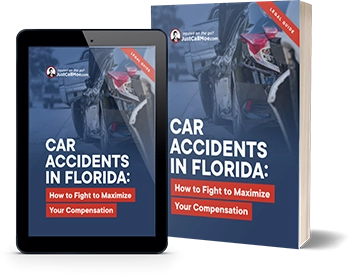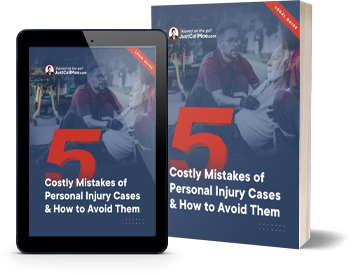What happens if you are involved in a car accident due to someone else’s careless driving? In the state of Florida, if you’re injured as a result of another person’s negligence on the road, you have the legal right to seek compensation for your damages.
However, determining the compensation you’re eligible for involves understanding comparative fault in car accident claims in Florida. This knowledge can help you navigate the legal matters specific to your claim far more effectively. Our experienced Winter Haven car accident lawyers will explore what comparative fault means and the nuances of Florida’s Comparative Negligence Law.
What Is Comparative Fault?
In determining legal responsibility for a motor vehicle accident in Florida, the legal standard of “comparative fault” fairly assesses each driver’s level of negligence to determine the appropriate allocation of responsibility. For example, if another driver ran into your vehicle due to their reckless behavior, you have the right to seek legal remedy to recover compensation for the injuries you have suffered.
Comparative fault is a legal concept that acknowledges the reality of accidents—they rarely occur as fully black and white. In almost every case, multiple parties contribute to an incident.
This principle allows for the fair apportionment of the compensation to reflect each party’s level of negligence, ensuring a more balanced and just outcome.
Understanding comparative fault goes beyond increasing your knowledge of legal principles. It has a direct impact on how much compensation you could receive. For instance, if a jury determines that you were 40% responsible for the accident that caused you $100,000 in damages, your ultimate compensation will be adjusted accordingly. In this case, you would receive $60,000 after deducting your share of the fault from the total damages.
Determining Fault in Car Accident Claims
Determining fault in a car accident case can often feel like navigating through a maze. Establishing who is at fault is pivotal in the legal process, particularly when it comes to awarding damages. While some cases have clear-cut blame, most often involve conflicting accounts from drivers who are reluctant to admit fault, especially when significant financial implications are at stake.
When fault must be determined in a personal injury case, the responsibility falls on the jury.
Juries, being composed of individuals with their own perspectives, can view the same set of facts in multiple ways, leading to subjective judgments on fault. One jury may assign fault to one party, while another may place the blame on someone else. This reality underscores the importance of presenting your case of why the fault of the accident lies with the other party in a compelling manner.
Types of Comparative Fault: Pure vs. Modified
Florida used to follow the former legal standard of “pure” comparative fault. In simple terms, this standard allowed a plaintiff to recover damages even though they were predominantly at fault for an accident.
For example, a plaintiff, Jane, failed to look both ways before proceeding through a stop sign and crossed in front of an oncoming vehicle going five mph above the speed limit resulting in an accident. If Jane was deemed 75% responsible for the injuries that occurred, she could still seek to recover the remaining 25% from the other party. Under this system, the fault was divided among the parties involved, with each party being held accountable for their respective contribution to the accident.
However, a significant shift occurred in Florida’s legal landscape on March 24, 2023, when Governor Ron DeSantis signed HB 837 into law. This legislation ushered in a new era in which Florida now implements a “modified comparative negligence” standard. This change means that a plaintiff’s ability to recover damages is now subject to a threshold. Specifically, if the plaintiff is found to be more than 50% at fault for their injuries, they are barred from seeking recovery from the other party.
How Florida’s Comparative Negligence Law Affects Your Compensation
The recent shift to the modified comparative negligence standard in Florida means that if a plaintiff’s liability in an accident exceeds 50%, they cannot pursue compensation from other involved parties under the new law.
For example, let’s revisit Jane’s example from above, except in this instance the car accident in Florida occurred under the modified comparative negligence law. If Jane is determined to be 75% at fault for the collision, she would not be able to pursue a claim for damages from the other driver, as her share of fault exceeds the 50% threshold set by the law.
Legal Strategies for Dealing with Comparative Fault
In the past, arguments over fault in car accident cases primarily affected the amount of compensation a victim could receive. However, with the new legal landscape in Florida, there is a higher risk that a victim may not receive any compensation at all if the defendant successfully disputes liability.
This change has shifted the dynamics of car accident claims, making defendants less inclined to settle and more willing to fight the case in court. Jane, from our hypothetical accident, would not be able to receive damages since she was well above the threshold. She will likely choose to proceed legally and fight the case, whereas previously, she would have had some incentive to settle, considering she would be receiving 25% of the compensation.
Contact an Experienced Car Accident Lawyer
With this shift from pure to modified comparative negligence, your choice of legal representation matters now more than ever for receiving the compensation you deserve. When facing a defendant who is adamant about disputing fault in a car accident claim, an attorney who is experienced in Florida law, willing and able to take your case to court, and prepared to litigate aggressively on your behalf can significantly improve your chances of securing a favorable outcome and obtaining the compensation you deserve.
Have you been in a car accident and are unsure about your rights under comparative fault laws in Florida? Let our skilled team at JustCallMoe guide you through the complexities of your case and fight for the compensation you deserve. Our knowledgeable car accident lawyers are ready to help! Contact us today for a free consultation.

 (866) 225-5663
(866) 225-5663



